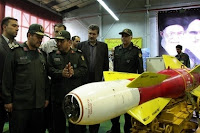Committee Against Ahmadinejad
 PR Newwire/US Newswire
PR Newwire/US NewswireAugust 28, 2007
NEW YORK, Aug. 28 /PRNewswire-USNewswire/ -- In Iran in last 365 days, there have been over 5000 rallies, strikes and demonstrations against the Iranian regime. According to Amnesty International, Iran continues to have one of the highest rates of executions in the world. The reported executions in 2007 have already exceeded 150. Presently, political opponents in Iran are charged with bogus criminal offenses and then executed in public. The United Nations has at least 52 times condemned the Iranian government.
House bills H. CON. RES. 21 & H. RES. 43 call on the United Nations Security Council to charge Iranian President Mahmoud Ahmadinejad with violating the 1948 Convention on the Prevention and Punishment of the Crime of Genocide and the United Nations Charter because of his calls for the destruction of the State of Israel.
For nearly 30 years, Iranian government has incited and then exploited public sentiments to spread negative propaganda against Christians, Jews, and Bahaies. A great example of such exploitation is Ahmadinejad's call for the destruction of Israel.
Iranian president Mahmoud Ahmadinejad is leading a dangerous crusade against the Iranian people and the civilized world. Ahmadinejad's Iran's Revolutionary Guards (IRG) organization is responsible for killing and torture of the Iranian people as well as training and equipping terrorist in Iraq.
Beginning in 2005, the Committee against Ahmadinejad (CAA) been led the effort in exposing Ahmadinejad's activities as well as organizing protests against his presence at the United Nations General Assembly. In the past 2 years, 30 members of the United States Congress, dozens of religious leaders, and numerous human rights advocates have supported CAA.
Once again, the United Nations General Assembly meeting is scheduled to begin in mid-September, 2007. Accordingly, CAA once more commences in order to mobilize the broad voices of discontent against Ahmadinejad, specially embracing the following goals:
1. Call the freedom and peace loving public citizens to voice solidarity with the families and victims of atrocities in both Iran and Iraq, as well as the victims of Iranian regime's terrorist acts in Buenos Aires, Khobar Tower and Lebanon Marine Barracks,
2. Call for U.N. member states to act by referring Iran's humans rights file to the U.N. Security Council for crime against humanity,
3. Urge the United Nations to appoint a special envoy to investigate Iran's human rights violations.
4. Call the US government to deny Ahmadinejad's presence in US.














